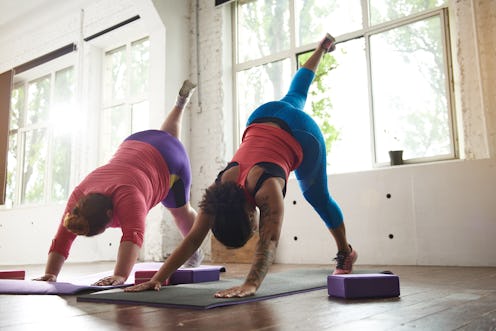
This piece is part of Bustle’s All Levels Welcome, a column about making fitness culture as accessible and inclusive as possible.
Even for people who generally enjoy engaging in physical activity — whether it’s dancing, boxing, or weight lifting — there are huge barriers to getting into the gym. On top of financial barriers and issues of physical access, gyms are often designed and operated with a particular body type in mind. Even a U.S. District Court Judge has declared that the design of physical fitness standards are discriminatory to women. This kind of bias is also present in gendered fitness marketing; gym design that privileges men's comfort over women's safety; class instruction that excludes people with disabilities; and personal trainer hiring rates that discriminate against trainers with large bodies.
The fitness industry’s widespread body shaming makes billions of dollars off of convincing people — particularly young girls and women of color in fitness — that their bodies are wrong, but the right type of fitness can “fix” them. However, there are many people and organizations making their way into the fitness industry that have a different message: body-positive fitness invites people with variously marginalized bodies into fitness spaces, reclaiming the word "health." To address these glaring problems in the fitness industry, many fitness enthusiasts, particularly queer people of color, are taking matters into their own hands.
“Your body doesn't have to be able to do anything at all in order to justify its existence and the way it is,” Ilya Parker, creator of Decolonizing Fitness, a social justice platform geared toward education and providing affirming fitness spaces, tells Bustle. “All bodies deserve to be treated with respect and care.”
Parker is an ACE-certified personal trainer and physical therapist assistant. He identifies as a fat trans personal trainer and points out that fitness “expertise” does not have to come with a certification to be valid. “Healers and wellness ‘experts’ can be awkward, fat, queer, trans, disabled, sex workers, chronically ill with mental health issues,” he says. “We don’t always need special certifications. Healing is a collective effort.” Parker explains that typical fitness certification trainings lack awareness of trans experiences, weight-neutral approaches to fitness, all the while pushing the idea that fitness is a moral obligation. “Toxic fitness often looks like a series of practices that uses corrective or penalizations tactics to elicit a certain response,” they tell Bustle.
Resisting the myths of toxic fitness culture within your own body is different for different people, according to Lindsey Page, personal trainer and founder of the Radically Fit gym in Oakland, CA. “I can do incredible things with my body,” she tells Bustle, “but according to the fitness industry, I do not 'look' like I am in shape. This is what we are fighting against and this is why we exist.” The tagline at Radically Fit is “Fit Is Not A Body Type,” in order to affirm people who share Page’s continuing journey with fitness. “I have personally had to work to undo 20-plus years of being told that my body was never good enough,” she says. “No matter how many miles I ran, how many core exercises I did — I would never look like a skinny white cis woman.”
As experienced as Page is in the industry, she still has to remind herself that “The fitness industry has worked hard on making money off of making people feel badly about how they look.” Internal experiences of body shame are not, then, an inherent flaw in her body but rather, perpetuated by a deeply integrated and damaging norm of the fitness industry.
"Body positive" is a term often used in a diluted way to include "every" body — a well-intentioned but misinformed practice that strips the movement from its mission to uplift marginalized bodies. But places like Radically Fit serve as an active reminder that body-positive language was created by fat women of color in movements for fat liberation. Of the ways that Radically Fit attempts to combat fat-shaming fitness norms within its own walls, Page says that “We hold and prioritize space for our Black and brown community by offering a POC-only class that feels welcoming and safe for those members.”
Page adds, “We also use language and messaging that is not only body positive, but fat positive. Overall, we are creating a space where the QTPOC community can feel safe and seen in every way.” At Radically Fit, for example, instructors don’t assume that fat-identified people can’t do jumping jacks, lift weights, or touch their toes, and refuse to “warn” only fat-identified people that intense workouts might be harder for them.

Parker says that in their experience trying to transform fitness both within yourself and structurally, it is important to ask yourself questions about who has access to the fitness spaces you're in. While Parker says there's no one way to work with marginalized communities (especially queer and trans communities of color), both fitness professionals and folks in any fitness situation need to interrogate who traditional fitness practices are designed for.
In fitness spaces, Parker says, people can ask themselves, "Do I have the power to ensure my needs are met? Do I have the power to impact someone else’s circumstances in a harmful or supportive way?" Sometimes, just asking yourself these questions can help you realize you have power, with yourself and to share with others in fitness spaces, that you didn't realize you have. Which is exactly what fitness, no matter what it means or looks like for you, is supposed to do: remind you exactly how powerful you are.